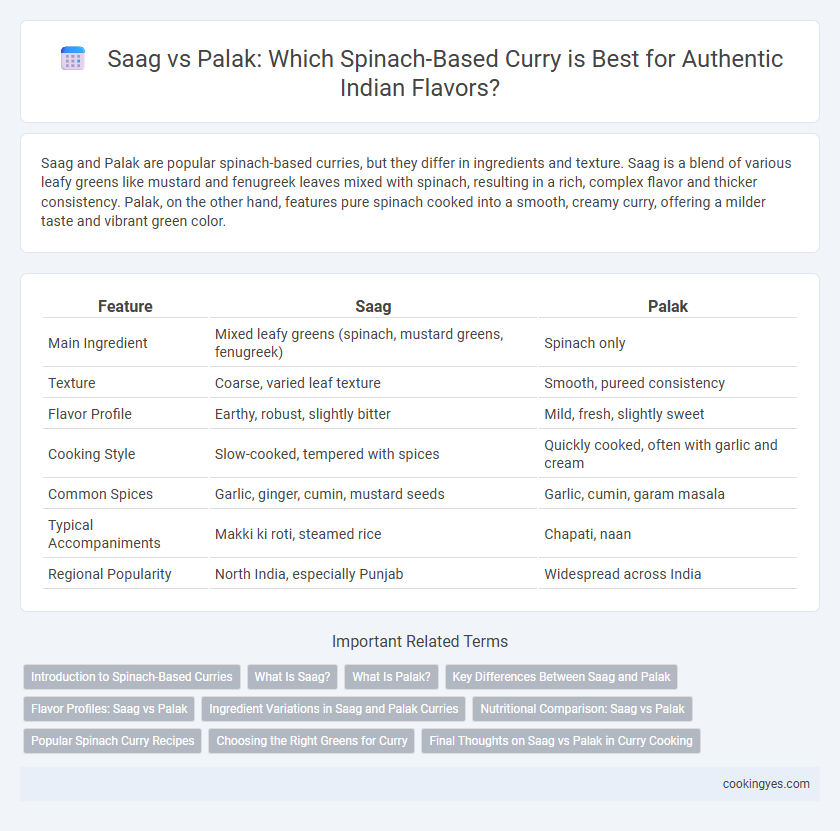Saag and Palak are popular spinach-based curries, but they differ in ingredients and texture. Saag is a blend of various leafy greens like mustard and fenugreek leaves mixed with spinach, resulting in a rich, complex flavor and thicker consistency. Palak, on the other hand, features pure spinach cooked into a smooth, creamy curry, offering a milder taste and vibrant green color.
Table of Comparison
| Feature | Saag | Palak |
|---|---|---|
| Main Ingredient | Mixed leafy greens (spinach, mustard greens, fenugreek) | Spinach only |
| Texture | Coarse, varied leaf texture | Smooth, pureed consistency |
| Flavor Profile | Earthy, robust, slightly bitter | Mild, fresh, slightly sweet |
| Cooking Style | Slow-cooked, tempered with spices | Quickly cooked, often with garlic and cream |
| Common Spices | Garlic, ginger, cumin, mustard seeds | Garlic, cumin, garam masala |
| Typical Accompaniments | Makki ki roti, steamed rice | Chapati, naan |
| Regional Popularity | North India, especially Punjab | Widespread across India |
Introduction to Spinach-Based Curries
Spinach-based curries such as Saag and Palak highlight the versatility of leafy greens in Indian cuisine, offering distinctive textures and flavor profiles. Saag incorporates a blend of mustard greens and spinach, delivering a robust, earthy taste with a coarse texture, while Palak specifically uses pureed spinach, resulting in a smooth, creamy consistency. These curries are rich in iron, vitamins A and C, and antioxidants, making them nutritious staples in traditional diets.
What Is Saag?
Saag is a traditional Indian leafy green curry made by blending various greens such as mustard leaves, spinach, and fenugreek, creating a rich and earthy flavor profile distinct from palak. Unlike palak, which exclusively uses pureed spinach, saag emphasizes a mixture of greens that contribute to its complex texture and nutritional diversity. This blend results in a thick, hearty dish that pairs well with flatbreads like roti or naan.
What Is Palak?
Palak is a spinach-based curry originating in Indian cuisine, characterized by its smooth, pureed texture made from fresh spinach leaves sauteed with garlic, onions, and spices. Unlike saag, which may include a blend of leafy greens such as mustard leaves or fenugreek, palak specifically uses only spinach, resulting in a milder and creamier flavor. This curry serves as the key ingredient in popular dishes like palak paneer, where cubes of paneer cheese are cooked in the rich spinach gravy.
Key Differences Between Saag and Palak
Saag and Palak are both spinach-based curries, but Saag typically includes a mix of leafy greens such as mustard leaves and fenugreek along with spinach, offering a more complex, earthy flavor. Palak exclusively uses spinach, resulting in a smoother texture and a milder, more delicate taste. Nutrient profiles vary as Saag's diverse greens provide higher levels of vitamins A, C, and iron compared to Palak's concentrated spinach content.
Flavor Profiles: Saag vs Palak
Saag curry features a robust, earthy flavor profile enhanced by a blend of mustard greens, fenugreek, and spices, creating a complex and slightly bitter taste. Palak curry, made exclusively from spinach, offers a milder, sweeter, and more delicate flavor with a creamy texture that complements a variety of meat and vegetarian dishes. The distinct seasoning differences give Saag a bold intensity, while Palak provides a smooth, subtle spinach essence.
Ingredient Variations in Saag and Palak Curries
Saag and Palak curries both feature spinach but differ significantly in their ingredient compositions. Saag incorporates a blend of leafy greens such as mustard greens, fenugreek leaves, and bathua alongside spinach, creating a complex, earthy flavor profile. Palak curry primarily relies on pureed spinach with mild spices like cumin and garam masala, resulting in a smoother, more delicate green curry.
Nutritional Comparison: Saag vs Palak
Saag curry combines spinach with mustard greens and other leafy vegetables, resulting in higher fiber, calcium, and vitamin A content compared to palak curry, which is primarily made with spinach alone. Palak curry is rich in iron and folate, offering benefits for blood health and cellular function, while saag provides a broader spectrum of micronutrients due to its mixed greens. Both curries are low in calories and packed with antioxidants, making them nutritious choices for a balanced diet.
Popular Spinach Curry Recipes
Saag and Palak are both popular spinach-based curry recipes widely enjoyed in Indian cuisine. Saag typically combines spinach with other leafy greens like mustard or fenugreek, creating a rich, earthy flavor and a textured consistency. Palak focuses solely on pureed spinach for a smoother, milder curry often enhanced with garlic, ginger, and spices such as cumin and garam masala.
Choosing the Right Greens for Curry
Saag and palak both feature spinach but differ in texture and flavor, with saag often blending multiple leafy greens such as mustard leaves, fenugreek, and spinach for a complex taste, while palak uses primarily pure spinach for a smoother, milder curry. Selecting the right greens depends on desired flavor intensity and texture, with saag offering earthiness and depth, ideal for robust curries, whereas palak suits lighter, creamier dishes. Nutritional benefits vary slightly, as saag's mixed greens provide a broader spectrum of vitamins and antioxidants compared to palak's singular spinach focus.
Final Thoughts on Saag vs Palak in Curry Cooking
Saag and Palak both highlight spinach's versatility in curry cooking, with Saag offering a rich blend of leafy greens beyond spinach, lending a complex, earthy flavor, while Palak centers exclusively on smooth, pureed spinach for a milder, creamier texture. The choice depends on desired taste intensity; Saag suits those seeking robust, hearty curries, whereas Palak appeals to fans of subtle, silky spinach dishes. Understanding these distinctions enhances curry preparation, ensuring optimal flavor profiles tailored to specific culinary preferences.
Saag vs Palak for spinach-based curry Infographic

 cookingyes.com
cookingyes.com